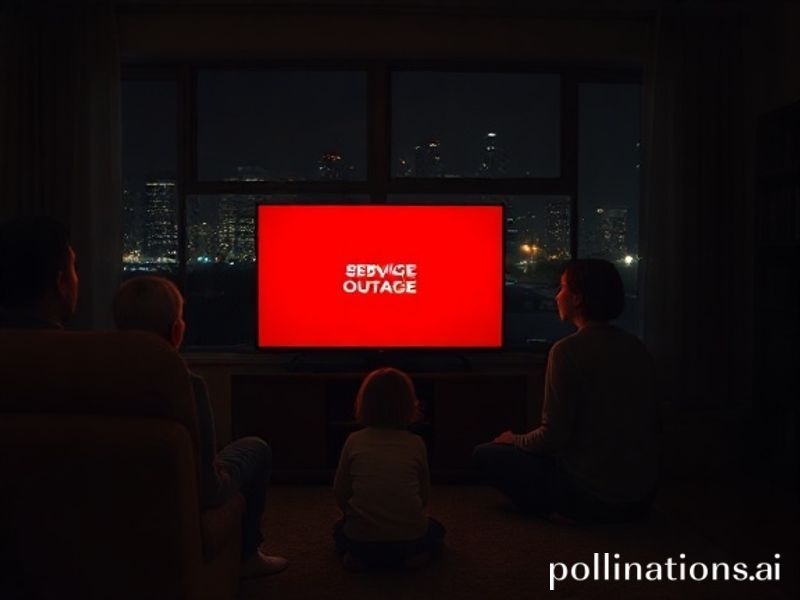When Cincinnati Sneezes, the World Drops Wi-Fi: The Global Fable of an Xfinity Outage
A Comcast Cable Goes Slack: How One Midwestern Outage Became a Global Parable
by Daria Voss, Dave’s Locker International Desk
CINCINNATI—When the Xfinity network in Ohio’s Hamilton County dropped dead at 07:14 local time last Tuesday, the immediate victims numbered roughly 1.2 million souls—give or take a few remote workers who swear they were “just about to send that quarterly report.” Within minutes the outage map glowed like a Christmas tree two weeks past its sell-by date, and #XfinityDown began trending in six languages, none of them especially polite. Yet from a perch 4,000 miles east, in a café where the Wi-Fi is paid for in Turkish lira and existential dread, the spectacle looked less like a tech hiccup than yet another morality play starring Homo sapiens and his beloved glass rectangle.
Consider the cast. There was the Ohio father who drove his children three towns over in search of a working Starbucks, only to discover the chain’s cloud-based espresso machines were equally flummoxed by the same DNS sinkhole. There was the Lagos-based scammer whose VPN exit node suddenly vanished, forcing him to abandon a perfectly good phishing email mid-sentence—surely a win for global cyber hygiene. Meanwhile, in Seoul, a BTS fan-cam uploader panicked that the drop in U.S. traffic might skew the algorithmic gods against her bias-wrecker. The butterfly effect has upgraded to fiber-optic.
Comcast, for its part, issued the customary statement: “We are aware of an issue affecting some customers and are working diligently to restore service.” Translation: a junior technician in Denver is Googling “BGP stands for what again?” while executives practice their sincere frowns for the evening news. By noon, the outage had metastasized to parts of Kentucky and Indiana, a geographic spread that foreign policy experts will recognize as roughly the same acreage NATO would surrender in the first 48 hours of a theoretical conflict. Analysts at Lloyd’s of London quietly re-priced “digital interruption” riders on Midwestern business policies, proving once more that where there’s static, there’s also margin.
The international subplot thickened when European markets opened. Shares of Comcast dipped 2.3 %, dragging down several U.S. media indices and prompting Frankfurt traders to mutter about “digital colonial overstretch.” A Swiss reinsurer circulated a memo warning that cascading U.S. ISP failures could trigger pandemic-level productivity loss, though it helpfully noted the upside: fewer cat videos means cheaper bandwidth for everyone else. In Beijing, state media could barely conceal its schadenfreude, running chyrons about “the fragility of unilateral hegemony in cyberspace” while quietly rebooting its own Great Firewall after yesterday’s Sichuan earthquake knocked TikTok offline in Chengdu. Fragility, it turns out, is the world’s most democratic export.
Back on the ground, humanity improvised. Neighbors who hadn’t spoken since the 2020 election suddenly bonded over a shared fondness for board games that didn’t require a patch update. A Cincinnati food-truck owner reported record sales after offering “offline specials” to the wandering Wi-Fi refugees, proving that capitalism can monetize even the apocalypse if you add sriracha. And somewhere in rural Kenya, an NGO worker using a $20 mesh-network node mused that the planet’s most reliable internet might now be the one strung together with car batteries and optimism.
By dusk, service returned in rolling green pixels across the outage map—like watching a time-lapse of mold reclaiming bread. Comcast credited “redundant pathways” and “heroic field teams,” omitting the detail that the fix involved unplugging a router in Cleveland and plugging it back in. The world exhaled, then immediately queued Netflix’s latest true-crime docuseries about a 1990s dial-up killer, because irony is the only renewable resource we’ve mastered.
So what did we learn? That the digital lifelines we routed through a single Midwestern fiber trench are as delicate as the treaties we sign to protect them. That our global economy can be kneecapped by a blinking LED. And that whenever the lights go out, humans will still find a way to charge you for the candle. Next week, when some other backbone burps and half of Frankfurt discovers Spotify silence, remember Ohio: the outage was local, the lesson planetary, and the punchline—per usual—us.







